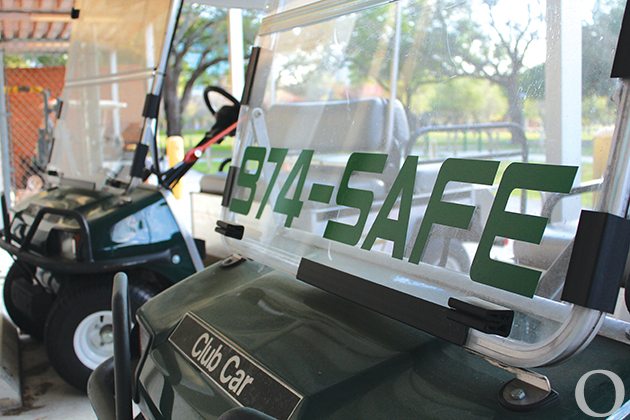SAFE team in the works for St. Pete campus

On a regular day in the semester, the Tampa campus Safe and Free Escort (SAFE) Team receives over 100 calls a night to help students reach their destinations safely and comfortably across campus. Soon enough, St. Pete students may have access to the same comforts with their own escorts.
In an effort to make the St. Pete campus safer and “more attractive” to students next fall, lieutenant governors of the St. Pete and Tampa campuses Isaiah Castle and Zach Blair-Andrews, respectively, are partnering up to propose and implement a SAFE team at the St. Pete campus.
The idea has been a topic of discussion since the beginning of the fall 2020 semester, but Castle, Blair-Andrews and governor of the St. Pete campus Andrea Rodriguez Campos actually began working on plans and proposals this semester during monthly meetings aimed at improving student life on the St. Pete campus.
The project is currently in the early stages, but Castle anticipates the idea will come to fruition when students fully return to campus, which could be as soon as the 2021-22 academic year.
SAFE teams are groups of student employees who transport individuals that request accompaniment if they are alone or feel unsafe walking on campus at night. The teams consist of golf cart drivers and walking teams that can meet students and take them anywhere on campus from 6:30 p.m. to 2 a.m.
Tampa’s SAFE Team also patrols the campus during that time and reports any unusual behavior to University Police.
Castle, along with Rodriguez Campos, first discussed the idea with Blair-Andrews in a fall 2020 meeting about potential improvements to the St. Pete campus.
“He introduced us to this program he said was really popular among students in terms of getting around campus in a safe and timely manner, and the reviews from the students on campus were really good,” Castle said.
After agreeing that a SAFE team could be useful for students at the St. Pete campus, the trio began collaborating on the project. Castle and Rodriguez Campos are in the process of writing a proposal for the project using a description of the Tampa SAFE Team’s functions that Director of the Tampa SAFE Team Evan Collins sent them as an aid.
In the 2020-21 school year, the Tampa SAFE Team was allocated $357,800, but it has not yet been disclosed how much the St. Pete SAFE Team will cost.
Collins is also writing a quote regarding the price and details for golf carts that could be sold to the St. Pete campus for their program, but the prices have not been finalized for release, according to Blair-Andrews.
The Tampa SAFE Team helps between 100 and 200 students every night, according to its website, but the security it provides is not the only reason Castle became invested in the project. For Castle, being able to employ more students on campus is also a draw of the program since a St. Pete SAFE team would consist of all-student patrols.
“It’s just another way of increasing student engagement … [which] is something that we’re trying to do 24 hours a day, seven days a week and 365 days a year,” Castle said.
After consolidation, the St. Pete campus experienced a 30% decline in enrollment after the university changed admissions requirements such as GPA and SAT scores to match those of the Tampa campus. To combat the decrease in enrollment, the St. Pete Student Government and admissions office are working together to identify programs like a SAFE team that might incentivize students to live on campus, according to Castle.
“We’re always going to do things that are in the best interests of our students, and just the concept of the SAFE team is in the best interests of our students,” Castle said.
Despite the importance of the project to Castle, it will not be implemented during his term as lieutenant governor. Though Castle and Blair-Andrews are currently doing the planning and drafting the proposals for the SAFE team at the St. Pete campus, the team will most likely be created next year, once more students return to campus, according to Castle.
“There are reports and rumors about [campuses] being back open in the fall semester of next year,” he said. “That’s obviously fantastic to see that and if there are students on campus, then we would love to see the program implemented.
“If that doesn’t happen, then we’d be fine with withholding the implementation of the program until the students get on campus.”
Blair-Andrews said the governors and lieutenant governors from both campuses will be meeting monthly to establish updates on the project and prepare to implement it as soon as students are back on campus.
Despite the uncertainty of the timeline, Castle is certain a SAFE team will improve the St. Pete campus.
“It is something that will allow campus life to be much safer,” Castle said. “It will give students a friendly experience and really enhance the ability of students to live on campus, which is obviously something that we’re trying to promote over here at St. Pete.”






